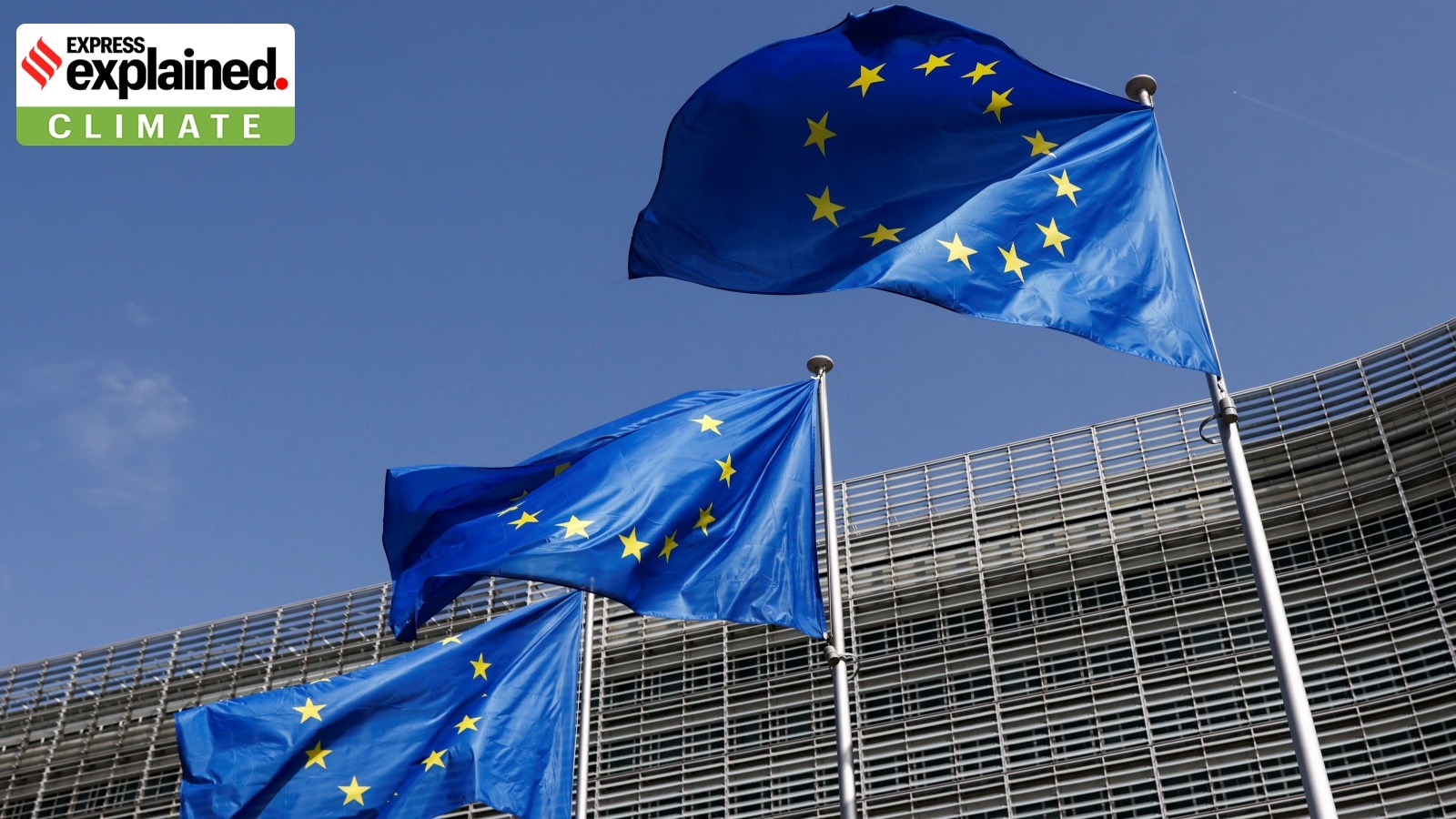What is the European Union’s CBAM, and why has BRICS condemned and rejected it?
Europe’s carbon border tax is an import duty on a product manufactured in a country that has more lax climate rules than the EU. The ostensible purpose is to check ‘carbon leakage’, but the tax makes items like steel or cement manufactured in countries like India more expensive, and thus less competitive, in European markets.
 CBAM, the EU says, is a “tool to put a fair price on carbon emitted during the production of carbon-intensive goods that are entering the EU, and to encourage cleaner industrial production in non-EU countries”. (Photo: Reuters)
CBAM, the EU says, is a “tool to put a fair price on carbon emitted during the production of carbon-intensive goods that are entering the EU, and to encourage cleaner industrial production in non-EU countries”. (Photo: Reuters)BRICS nations have “condemned and rejected” the Carbon Border Adjustment Mechanisms (CBAM) of the European Union (EU) and similar restrictive trade measures, saying they undermine their transition to a cleaner economy.
CBAM is an import duty that is imposed by Europe on goods produced in other countries by processes that lead to greater carbon emissions than domestic European manufacturers are allowed to emit.
The ostensible purpose is to check “carbon leakage”, but this has the effect of making items like steel or cement manufactured in countries like India more expensive, and thus less competitive, in European markets.
Developing countries including India and China have been strongly critical of CBAM, and called it a unilateral and unfair trade barrier. They have said CBAM violates international agreements on both trade and climate, and have raised this issue at multiple international forums, including the annual climate conferences. But the EU has refused to relent.
On Monday (July 7), BRICS, a group of nine large developing economies including India, said in a statement issued at their summit in Rio de Janeiro, Brazil: “We condemn and reject unilateral, punitive and discriminatory, protectionist measures that are not in line with international law, under the pretext of environmental concerns, such has unilateral and discriminatory carbon border adjustment mechanisms (CBAMs), due diligence requirements with detrimental impacts on global efforts to halt and reverse deforestation, taxes and other measures…”.
What are climate-related trade restrictions such as CBAM?
CBAM, rolled out by the EU in 2023, taxes certain products coming in from other countries on the basis of the emissions footprint of their production process. So, if a product imported into the EU was produced by a process that entailed higher emissions than the emissions standard for that product in Europe, it will be taxed.
CBAM, the EU says, is a “tool to put a fair price on carbon emitted during the production of carbon-intensive goods that are entering the EU, and to encourage cleaner industrial production in non-EU countries”.
The European Commission’s website describes CBAM thus, “Designed in compliance with World Trade Organization (WTO) rules and other international obligations of the EU, the CBAM system will work as follows: EU importers will buy carbon certificates corresponding to the carbon price that would have been paid, had the goods been produced under the EU’s carbon pricing rules.
“Conversely, once a non-EU producer can show that they have already paid a price for the carbon used in the production of the imported goods in a third country, the corresponding cost can be fully deducted for the EU importer.”
CBAM will apply in its “definitive regime” from 2026, with a “transitional phase” of 2023 to 2025, the EU has said.
So what is the problem with such a policy tool?
CBAM keeps European industries competitive while also maintaining high environmental standards. Industries are disincentivised from relocating to countries that have less strict emission norms where production may be cheaper – a situation described as carbon leakage. In the process, Europe hopes to contribute to reducing global emissions.
However, this policy tool hurts the export competitiveness of developing countries such as China and India. To these nations, it appears as an unfair barrier to trade, and a violation of international agreements.
For example, the Paris Agreement adopted in 2015 protects developing countries from the social and economic impacts of “response measures” against climate change. And the Dubai climate meeting (COP28) in December 2023 acknowledged that “measures taken to combat climate change, including unilateral ones, should not constitute a means of arbitrary or unjustifiable discrimination or a disguised restriction on international trade”.
Developing countries have also pointed out that CBAM overlooks the “differentiation” embedded in the global climate architecture that allows them to be treated differently from the developed nations.
Industries in developed economies with emissions standards comparable to the EU’s stand to benefit from a CBAM-like measure, since their products would not be taxed and, hence, become more competitive in the European market.
CBAM, therefore, can have the net effect of helping industries in the developed world, while putting those in developing countries at a disadvantage.
How have developing economies pushed back?
While the BRICS statement this week is the strongest used so far, the opposition from India and other developing countries has been firm and consistent.
A formal submission by China, India and some other countries to discuss climate change-related trade measures such as those introduced in the EU delayed the opening plenary of the climate conference in Baku, Azerbaijan (COP29), on November 11 last year by several hours.
On behalf of the BASIC group of countries that also includes India, Brazil and South Africa, China requested a discussion on these issues at the climate meetings. It met with strong opposition from the EU and some other countries, and the proposal had to be put on the back burner.
The BASIC group had opposed the carbon border taxes policy at COP27 in Sharm El Sheikh, Egypt, as well, saying it could “result in market distortion”. In a joint statement issued on November 15, 2022, these countries said: “Unilateral measures and discriminatory practices, such as carbon border taxes, that could result in market distortion and aggravate the trust deficit amongst Parties, must be avoided.”
The BASIC countries called for a “united solidarity response by developing countries to any unfair shifting of responsibilities from developed to developing countries”.
What other trade measures have countries taken to ostensibly address climate change?
CBAM, the EU’s policy to tax carbon-intensive products such as iron and steel, cement, fertiliser, aluminium, and electricity generation from 2026, was proposed in 2021. CBAM was not the first-of-its-kind trade measure linked to climate change, but it is expected to be the most impactful till now.
This is because the EU is a large market, accounting for about 15% of global imports. While CBAM currently applies to only a handful of goods, the list is set to be expanded to a large number of other items in the coming years.
Other countries too may be tempted to bring in similar regulations. The United Kingdom and Canada have been reported to be considering their own versions of CBAM.
There are other non-tariff trade measures linked to climate change.
Several regions, including the EU, ban the import of products made from illegally harvested forests.
The incentives offered to American clean energy technology or electric vehicle industries in the US federal Inflation Reduction Act (IRA) that was signed into law by former President Joe Biden in August 2022, are examples of climate-related non-tariff measures that can impact and reshape global trade.
Climate change is also accelerating a process of increasing protectionism that is being driven by several other considerations, including economic, strategic, and security-related. While President Donald Trump’s tariffs on imports is not cloaked in climate imperatives, it does play on America’s fears on energy security which is threatened by the heavy concentration of renewable energy supply chains in China.
In fact, the dominance of China in the control of resources and technologies related to new energy sources — solar, wind, batteries, and critical minerals — far exceeds that of oil-producing countries in the fossil fuel era. This too has been facilitated by climate change that is forcing a global energy transition.
=======================
This explainer draws on two earlier explainers published on November 13, 2024 and November 17, 2022.
- 01
- 02
- 03
- 04
- 05






































